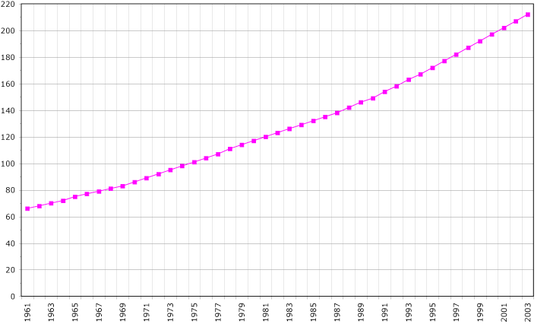Demographics of Vanuatu
This article is about the demographic features of the population of Vanuatu, including population density, ethnicity, education level, health of the populace, economic status, religious affiliations and other aspects of the population.
The population of Vanuatu is 98.5% indigenous Melanesians. About 30,000 live in the capital, Port Vila. Another 10,700 live in Luganville (or Santo Town) on Espiritu Santo. The remainder live in rural areas. Approximately 2,000 ni-Vanuatu live and work in New Caledonia. Although local pidgin, called Bislama, is the national language, English and French also are official languages. Indigenous Melanesians speak 105 local languages.
Christianity has had a profound influence on ni-Vanuatu society, and an estimated 90% of the population is affiliated with a Christian denomination. The largest denominations are Presbyterian, Roman Catholic, and Anglican. John Frum, a syncretic sect, also is important on Tanna Island.
CIA World Factbook demographic statistics
The following demographic statistics are from the CIA World Factbook, unless otherwise indicated.

Population
208 869 (July 2006 est.)
Age structure
0-14 years:
32.6% (male 34 804/female 33,331)
15-64 years:
63.7% (male 67 919/female 65 138)
65 years and over:
3.7% (male 4 027/female 3 650) (2006 est.)
Population growth rate
1.49% (2006 est.)
Birth rate
23,02 births/1,000 population (2006 est.)
Death rate
7,82 deaths/1,000 population (2006 est.)
Net migration rate
0 migrant(s)/1,000 population (2006 est.)
Sex ratio
at birth:
1.05 male(s)/female
under 15 years:
1.04 male(s)/female
15-64 years:
1.04 male(s)/female
65 years and over:
1.11 male(s)/female
total population:
1.05 male(s)/female (2006 est.)
Infant mortality rate
53.8 deaths/1 000 live births (2006 est.)
Life expectancy at birth
total population:
62.85 years
male:
61.34 years
female:
64.44 years (2006 est.)
Total fertility rate
2.7 children born/woman (2006 est.)
Nationality
noun:
Ni-Vanuatu (singular and plural)
adjective:
Ni-Vanuatu
Ethnic groups
Ni-Vanuatu 98.5%, other 1.5% (1999 Census)
Religions
Presbyterian 36.7%, Anglican 15%, Roman Catholic 15%, indigenous beliefs 7.6%, Seventh-day Adventist 6.2%, Church of Christ 3.8%,[1] other 15.7% - see Religion in Vanuatu
Languages
Local languages (more than 100) 72.6%, Bislama or Bichelama 23.1%, English (official) 1.9%, French (official) 1.4%
Literacy
definition:
age 15 and over can read and write
total population:
53%
male:
57%
female:
48% (1979 est.)
| ||||||||
References
- ↑ "World Convention » Vanuatu". Retrieved 2012-06-09.